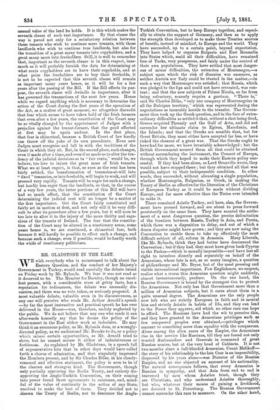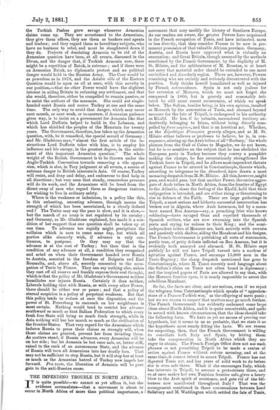MR. GLADSTONE IN THE EAST.
WE wish everybody who is accustomed to talk about the Eastern Question, and the conduct of her Majesty's Government in Turkey, would read carefully the debate raised on Friday week by Mr. Rylands. We fear it was not read as it deserved to be. The Member for Burnley, though an excel- lent person, with a considerable store of gritty facts, has a reputation for tediousness, the debate was unusually dis- cursive, and there was no vote taken, or seriously proposed. A most valuable debate, valuable even in its discursiveness, as any one will perceive who reads Mr. Arthur Arnold's speech —by far the most instructive and practical speech he has ever delivered in the House—was, therefore, unduly neglected by the public. We do not believe that any one who reads it can afterwards honestly say that he deems the policy of the Government in the East either weak or indecisive. He may think it an erroneous policy, as Mr. Rylands does, or a wrongly- directed policy, as we understand Mr. Bourke to do, or a policy which misses certain opportunities, as Mr. Arnold tried to show, but he cannel accuse it either of indecisiveness or feebleness. As explained by Mr. Gladstone, in a speech full of argumentative hits that in other days would have called forth a chorus of admiration, and that singularly impressed the Members present, and by Sir Charles Dilke, in his closely- reasoned and effective statement, the policy is seen to be of the clearest and strongest kind. The Government, though only partially approving the Berlin Treaty, and entirely dis- approving the Anglo-Turkish Convention, on their coming into power found those agreements in existence, and, mind- ful of the value of continuity in the action of any State, resolved to make the best of them. They decided not to disown the Treaty of Berlin, nor to denounce the Anglo-
Turkish Convention, but to keep Europe together, and especi- ally to obtain the support of Germany, and then so to apply the strength thus developed as to make those Treaties sources of benefit, instead of mischief, to Europe and the world. They have succeeded, up to a certain point, beyond expectation. They have helped to organise Bulgaria and East lloumelia into States which, amid all their difficulties, have remained free of Turks, very prosperous, and fairly under the control of their own populations. They have settled that most danger- ous of minor difficulties, the extension of Montenegro,—a subject upon which the risk of disunion was excessive, as neither Austria nor Italy could be trusted in the matter,—in such a way that Montenegro was satisfied ; that Russia, which was pledged to the lips and could not have retreated, was con- tent ; and that the new subjects of Prince Nicola, so far from being refractory, scarcely require a garrison. " There is," said Sir Charles Dilke, " only one company of Montenegrins in all the Dulcigno territory," which was represented during the negociations as incurably hostile to the transfer. The Govern- ment then took up the Greek question, and in the face of extra- ordinary difficulties so settled it that, without a shot being fired, Greece acquired Thessaly and the Gulf of Arta, and did not surrender her ultimate claim to Epirus, Macedonia, and the Islands ; and that the Greeks are sensible that, but for Great Britain, they must either have accepted far less, or have risked the chances of a great war. That the Greeks ought to have had far more, we have invariably acknowledged ; but the British Government secured them all that could be obtained without surrendering the instrument, the Concert of Europe, through which they hoped to make their Eastern policy suc- cessful. If they had been alone, as Lord Granville wrote, they would not have stopped there ; but they obtained all that was possible, subject to their indispensable condition. In other words, they succeeded, without alienating a single population, whether Montenegrin, Bulgarian, or Greek, in making the Treaty of Berlin as effective for the liberation of the Christians of European Turkey as it could be made without dividing Europe, and far more effective than the Tories ever intended to make it.
There remained Asiatic Turkey, and here, also, the Govern- ment have pressed forward, and are about to press forward persistently on the same lines. They have secured the settle- ment of a most dangerous question, the precise delimitation of the frontiers between Russia, Turkey in Asia, and Persia, which there was a disposition to delay, and out of which a dozen disputes might have grown ; and they are now using the Convention to enable them to take up effectively the most difficult subject of all, reform in Armenia. Many Liberals, like Mr. Rylands, think they had better have denounced the Convention ; but if they had, they must have given back Cyprus to the Pashas—which is morally impossible—and have lost all right to interfere directly and separately on behalf of the Armenians, whose fate is not, as so many imagine, a question of philanthropy and Mr. Bryce, but of the most pressing and visible international importance. Few Englishmen, we suspect, realise what a storm this Armenian question might suddenly, almost instantaneously, produce. On the one hand, the Russian Government is bound by the strongest ties to protect the Armenians. Not only has that Government more than a million of Armenian subjects, but it cares about them in a quite unusual degree. The Armenians are the only people now left who are strictly European in faith and in mental bias and strictly Asiatic in habits of life, and they can lend to the Power they approve, aid which no other race can hope to afford. The Russians have had the wit to perceive this, and they have granted to the Armenians privileges such as few conquered peoples ever obtained,—privileges which amount to something more than equality with the conquerors. Alone among the alien races of the Empire, the Armenians rise in the service like Russians, till they are found not only trusted Ambassadors and Generals in command of great Russian armies, but at the very head of Cabinets. It is not two months since a full-blooded Armenian, Count Melikoff- the story of his relationship to the late Czar is an impossibility, disproved by his years alone—was Dictator of the Russian Empire, and no one objected on account of his nationality. The natural consequence follows, that every Armenian is Russian in sympathy, and that Asia from end to end is traversed by men whom Asiatics trust, though they are Christians, and who understand Asiaties thoroughly, but who, whatever their means of gaining a livelihood, are devoted to St. Petersburg. The Russian Government cannot surrender this race to massacre. On the other hand,
the Turkish Pashas grow savage whenever Armenian claims come up. They are accustomed to the Armenians, they give them offices, they use them as bankers and agents and traders ; and they regard them as hereditary subjects, who have no business to rebel, and must be slaughtered down if they do. Projects of desolating Armenia to be rid of the Armenian question have been, at all events, discussed in the Divan, and the danger that, if Turkish Armenia rose, there might be a repetition of Batuk, is extreme ; and if there were an Armenian Batuk, no diplomatic protest and no political danger would hold in the Russian Army. The Czar would be as powerless as in 1878, And the Asiatic side of the Eastern Question would be upon us all at once, with this novelty in our position,—that no other Power would have the slightest interest in aiding Britain in enforcing any settlement, and that she would, therefore, either be compelled to remain passive, or to assist the authors of the massacre. She could not single- handed resist Russia and coerce Turkey at one and the same time. The only way to avoid that danger, which may occur next month, or next week, or to-morrow, if Armenian patience gives way, is to insist on a government for Armenia like that which Lord Dufferin helped to build in the Lebanon, and which has shielded the peoples of the Mountain for twenty years. The Government, therefore, has taken up the Armenian question, with, be it remarked, the special accord of Germany ; and Mr. Gladstone says, " almost the first article of the in- structions Lord Dufferin takes with him, is to, employ his influence and his energy, in the greatest degree, in the settle- ment of this important Armenian question." The whole weight of the British Government is to be thrown under the Anglo-Turkish Convention towards removing a vile oppres- sion, which is also, in Tory judgment at all events, a source of extreme danger to British interests in Asia. Of course, Turkey will resist, and deny and delay, and endeavour to find help in all directions ; but very soon that steady, remorseless pressure will do its work, and the Armenians will be freed from the direct sway of men who regard them as dangerous traitors, for wishing to live in ordinary safety.
Where is the weakness or indecision, in a policy like this, in this unhasting, unresting advance, through means the strength of which has been ascertained, to a clearly defined end ? The Tories may say the pace is slow, and it is slow,— but the march of an army is not regulated by its cavalry ; and Germany, as Mr. Gladstone explained, has made it a con- dition of her support that one question shall be taken up at one time. To advance too rapidly might precipitate the collision which is sure to come some day, but which all parties alike sincerely wish, if advance is only con- tinuous, to postpone. Or they may say that the advance is at the cost of Turkey ; but then that is the condition of any advance at all, a condition they recognised and acted on when their Government handed over Bosnia to Austria, assented to the freedom of Bulgaria and East Roumelia, and, above all, secretly consented to the occu- pation of Tunis by France. They can say nothing else, unless they cast off all reserve and frankly express their real thought, which is that the policy of Mr. Gladstone's Government neither humiliates nor injures Russia. Certainly it does neither, Liberals holding that with Russia, as with every other Power, there should be either war or peace ; and that a policy of eternal suspicion is a policy of perpetual weakness. But that this policy tends to reduce at once the disposition and the power of St. Petersburg to encroach on her neighbours is most certain. Nothing would tend to restrict her advance southward so much as that Balkan Federation to which every fresh free State will bring so much fresh strength, while in Asia nothing will bar her march so much as the civilisation of the frontier States. That very regard for the Armenians which induces Russia to press their claims so strongly will, when those claims are granted, prevent her from invading them. As matters stand, if Russia advances, every Armenian will be on her side ; but let Armenia be but once safe, or, better still, raised to the rank of an autonomous State, and the advance of Russia will turn all Armenians into her deadly foes. That may not be sufficient to stop Russia, but it will stop her at least as much as the Armenian hatred of Turkey now impels her forward. Pro tanto, the liberation of Armenia will be pure gain to the anti-Russian cause.



































 Previous page
Previous page